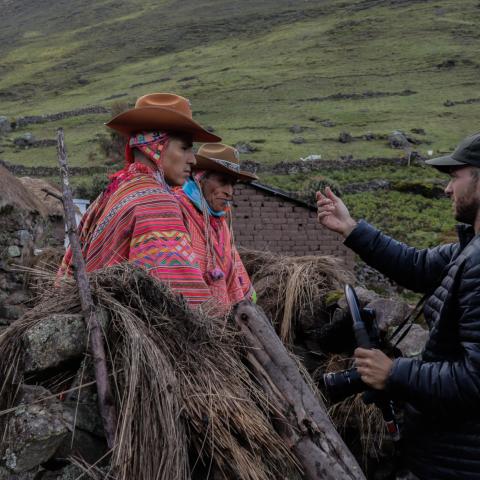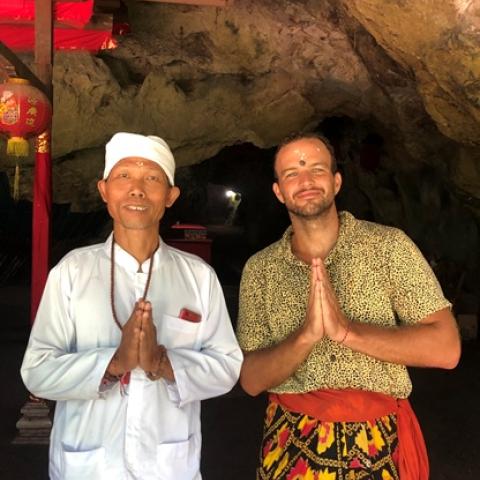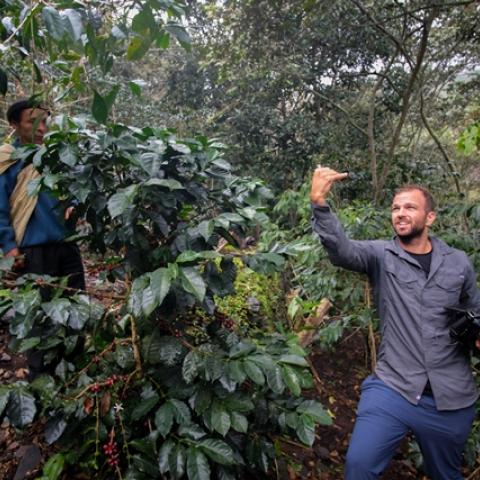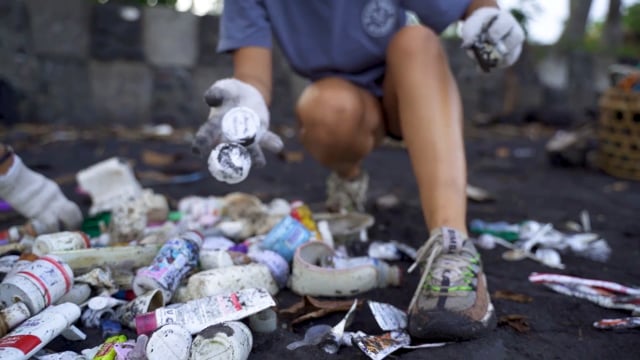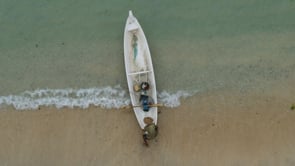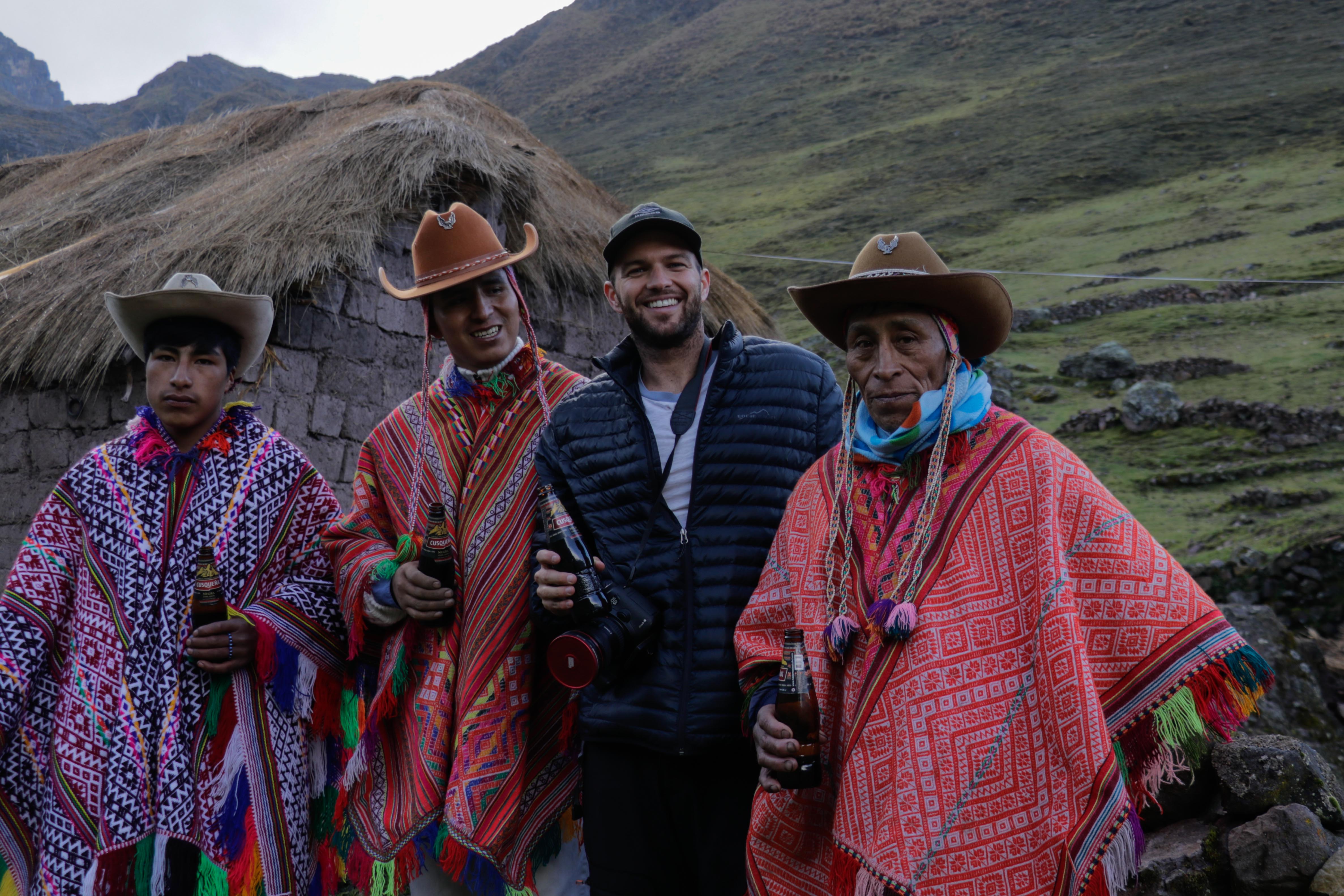
"By the time we were nearing the end of the documentary, we had all become friends. We would show up with their favorite beer and just hang out for a few hours before we started working. Relationships are the most important part of the story, and they take time to build." - Eric Ebner, filming Opening the Earth: The Potato King © Aaron Ebner
Documentary filmmaker Eric Ebner is no stranger to the Banff Centre Mountain Film and Book Festival. Ebner produced Voice Above Water, winner of the Best Short Mountain Film in the 2020 Banff Mountain Film Competition and selected for the 2020/21 World Tour, and co-directed Opening the Earth: The Potato King (2019 Banff Mountain Film Competition finalist). His latest film Perpetual Plastic was filmed while Ebner was locked down in Indonesia due to the pandemic. We caught up with him for a Q&A:
Tell us about your filmmaking career – how did you get into filmmaking and what journey has it taken you on, so far?
From an early age I knew it was important for me to have a creative outlet. I tried a lot of different mediums, and nothing really stuck. After almost 30 years, video was one of the only things I had never tried. I was a good photographer, but I craved to tell more in-depth, human stories. I was initially afraid to make the jump. Eventually my fear of never truly chasing my dream overcame my fear of failure, and I just went for it. It quickly became clear that this was something I was going to pursue for the rest of my life. When I committed to filmmaking, my entire life changed. Project by project, my career has been taking me all around the world to tell stories that I am very passionate about. One project [Perpetual Plastic] took me to Indonesia where I then got locked down because of COVID. It was the best accident of my life, I lived there for almost a year and a half.
What motivates you as a filmmaker?
I find myself drawn to peoples and cultures that defy the norms of society, and challenge our own preconceptions. I’m motivated to tell stories that make the viewer think about the world differently, to think about themselves differently. After a few films I came to realize that all of my subjects are in the later stages of life. Something about their perspective on life and how to live resonates in me, and it's an opportunity to reevaluate my own life and priorities. These themes are reoccurring in my films, and it was never a preconceived plan. It’s just who I am and what kind of stories I am interested in telling.
Ocean conservation is undoubtedly a topic close to your heart (as seen in your films Voice Above Water and Perpetual Plastic). Why?
I’ve always loved the water – it's something that I have always been drawn to. I grew up on a lake in Michigan, USA. Many of my films celebrate nature and the connection to nature that people feel. Films about conservation was never necessarily my goal, I guess it was a natural progression. I went from appreciating these themes, to attempting to help them. I want my films to make a difference to people, so to be able to raise awareness and support for conservation has been a great twist to my career arc and makes me really proud.
Why do you think your documentaries resonate with audiences across the globe?
My subjects are all unique, sometimes even strange. But at the heart of their character is the human element that everyone can relate to. I’m really drawn to emotions and motivations that we all share in common. I think that is why people from different parts of the world can identify with my films. Because at their core they aren’t rooted in one culture, they are rooted in humanity.
How do you personally try to lead a more sustainable lifestyle?
I’m not perfect, I’m still evolving, and no-one should feel ashamed if they aren’t perfect. But one thing I do well is that I simply don’t participate in the culture of consumption. On a daily basis I ask myself, do I need this? 99% of the time the answer is no. You won’t find me buying fast fashion or updating my cell phone every year. To me my 4 year old iPhone 6 is a badge of honor and even a bit of a statement. I make conscious decisions to keep my life simple. It takes a bit of discipline, but it makes me feel like I’m a better person and at least I am trying. I’m at a place in life where I don’t have anyone depending on me, so I can live my life really light. One thing I love about filmmaking is that I get really educated on the issues I am covering, and it holds me accountable to my actions. It has changed my life for the better.
Do you have any tips from a filmmaker’s perspective to lessen your environmental footprint during the filmmaking process?
I think there is one thing that filmmakers and production companies can do to lessen their environmental impact AND to tell more authentic stories – which is to do less! On big budget productions I often see massive teams with truckloads of gear. The fanciest lights, lenses, and dozens of people running around the location. Once you enter this world, it’s clear that there is definitely ego in this industry. People need to have the biggest, nicest equipment, they need to feel important, and they need to spend a lot of money. They equate this obsession with modern gear and lots of investment with a good product. This is not necessarily the case, and this becomes incredibly wasteful. On top of that, you lose the personal connection to your subjects. Great stories are authentic stories, and it takes time to build relationships. It’s just very hard to connect with people when it’s one subject and many crew members. I have seen personally that fancy equipment doesn’t make a project a success, the story does. Value the story above all else, and you will have a process that is more in harmony with your surroundings and your subjects.
I loved the character Wayan Nyo in Voice Above Water – do you have an update on him for my fellow fans?
Everyone loves Wayan, how could you not? I went to his Indonesian island a few months ago and tried to pay him a visit. I saw his daughter and she told me he was at his garden for the day, working away like he does. The economy of his island is based around tourism, but because of COVID there has been almost zero visitors. When I visited, I was surprised to see that all of the beaches that were typically used for tourism have been turned into seaweed farms. The island needed to adapt, and they are becoming more sustainable by taking back some of their beaches. For me it was really exciting to see, and Wayan has his own seaweed farm now.
What’s next for you?
While I was in Indonesia during lockdown I teamed up with some local creatives and we created a short documentary that we are very excited about. We are carrying on the theme of plastics in our ocean, yet told in a very different style. Perpetual Plastic follows artist Liina Klaus as she creates an art installation that will go on to win first prize at the National Geographic Plastic Innovation Challenge. The film follows Liina throughout her personal journey, and the journey of a single-use plastic within our culture of consumption. I’m really proud of Perpetual Plastic, I’ve never seen another film like this. It’s a really cool collaboration of filmmakers and artists from around the world (the team comes from over 7 countries), all giving their expertise to help push this conversation forward. Keep an eye out for it!
Authors: Eric Ebner and Jess Elliott
